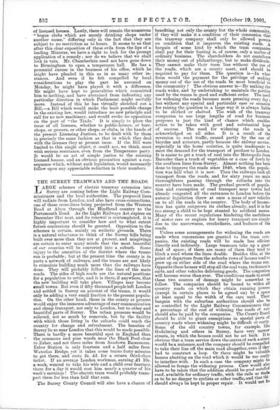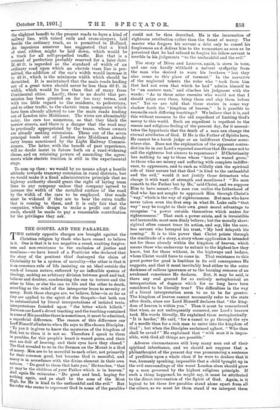THE SURREY TRAMWAYS AND THE ROADS. TI ARGE schemes of electric
tramway extension into Surrey are coming before the Light Railway Com- missioners and the local authorities. The proposed lines will radiate from London, and also have cross-connections, one of these cross-lines being projected from the Western Road at Alton through the Hindhead country to the Portsmouth Road. As the Light Railways Act expires on December 31st next, and its renewal is contemplated, it is highly iniportant to consider how and to what extent future concessions should be granted. Opposition to the s-chemes is certain, mainly on esthetic grounds. There is a natural reluctance to think of the Surrey hills being biiilt over more than they are at present, and misgivings are certain to enter many Minds that' the most beautiful of our counties will be converted into a suburb. Some injury to the amenities of the district where the 'trams run is probable; but at the' present time the county is in parts a network of railways, and the trams are not likely to stimulate building much more than the railways have done. They will probably follow the lines of the main roads. The sides of high roads are the natural positions for a population to settle, and it is there, if anywhere, that the new building will take place. Villages may become small towns. But even if fifty thousand people left London and settled in Surrey on account of the trains, it would only be adding a very small fraction to' the present popula, tfon. On the other hand, those in the county at present *could enjoy the immense advantage of easy communication and cheap transport, not only to London, but to other and beautiful parts of Surrey. The urban pressure would be relieved, not so much by removals, but by the facility with which those living in the suburbs could reach the country for change and refreshment. The beauties of Surrey lie so near London that this would be made possible. There is hardly a more beautiful spot in England than the commons and pine woods near the Black Pool close to Esher, and not three miles from Saudown Racecourse. Esher Station is only fourteen and a, half miles from Waterloo Bridge. yet it takes some trains forty minutes to get there, and costs 2s. 4d. for a return third-class ticket. If an average London workman, earning ..Z1 10s. a meek, wanted to take his wife and a child over fourteen there for a, day it would cost him nearly a quarter of his week's earnings ! The electric tram would probably trans- port them for less than half that sum.
, The Surrey County Council will also have a chance of benefiting not only the county •but • the whole community., if they will 'make it a condition of their concession that the tramway company. shall only be allowed powers on condition that it improves the existing roads. A. bargain of some kind by which the train companies shall pay for their footing is, of course, only a matter of oialinary business. The shareholders do not contribute their money out of philanthropy, but to make dividends. They cannot make their tram line without the use of the roads, .which are a county asset, and should be required to pay for them. The question is—In what form would the payment for the privilege of making money out of the use of the roads be most beneficial to the community ? The obvious answer is—By making the roads wider, and by undertaking to maintain the portion used by the trains in good. and sufficient order. The neea for widening the road; becomes more pressing every day; but without any special and particular case or occasion for raising the question in a large way it is always liable to be shirked or shelved. The wish of the tramway companies to use large lengths of road for business purposes is just the kind of chance which enables action to be taken with good and substantial hope of success. The need for widening the roads is acknowledged on all sides. It is a result, of the reversion to road traffic, caused partly by the use of bicycles and autocars, partly because the railway service, especially in the home counties, is quite inadequate to meet the demand for the transport of produce to London. It is easier to get a truck of coal into the Metropolis from Barnsley than a truck of vegetables or a case of fowls by the southern lines from Surrey. Almost nothing has been done to improve the roads since 1810, when the popula- tion was half what it is now. Then the railways took all transport from the roads, and for sixty years no main thoroughfares passing through the suburbs into the country have been made. The gradual growth of popula- tion and. resumption of road transport near towns had already. congested all the entrances to London before the autocar legislation threw at once a mass of new vehicles on to all the roads in the country. The body of locomo- tion has quite outgrown its clothes already, and it is far too strong a child to be kept stunted by artificial means. Many of the recent regulations hindering the usefulness of motor cars or engines for heavy transport are simply due to the narrowness, crookedness, and badness of the roads.
Unless some arrangements for widening the roads are made when concessions are granted to the tram com- panies, the existing roads will' be made less efficient directly and indirectly. Large tramcars take up a great deal of space ; if there are many of them they tend to block a road where the lines double. Besides this, at the point of departure from the suburbs 'rows of houses tend to grow upon either side of the road where the trams sun. Opposite these houses will stop all the coal vans, tradesmen's carts, and other vehicles delivering goods. The congestion will become worse than ever. The conditions made to avoid these two sources of -damage might be somewhat as follow. The companies should be bound to widen all country roads on which they obtain running powers (except in certain places to be agreed on) by a space at least equal to the width of the cars used. Their bargain with the suburban authorities should also be so controlled by the Light Railway Commissioners that a percentage of the cost of widening the roads of exit should also be paid by the companies. The County Board should be able to grant exemptions in special parts of country roads where widening might be difficult or costly. Some of the old country, towns, for example, like God.alming and others in Surrey, have very narrow streets, in which the houses could not be set back. It is obvious that a tram service down the centre of such a street would be a nuisance, and the company should be compelled to take their line off the main road altogether, even if theY had to construct a loop. Or there might be -valuable houses abutting on the road which it would be too costlY to interfere with. In such a case the company might 'be allowed to forego the widening process. Care would also have to be taken that the addition should be good metalled road, available, for ordinary traffic, with the rails so Made as to be no danger to cyclists or other traffic, and that tub' should always be kept in proper repair. It would not bi the slightest benefit te the present roads to have a kind of railway line, with raised mile and cross-sleepers, laid beside the ordinary track, as is permitted in Holland. An ingenious amateur has suggested that a kind of steel ribbon might be laid down, which would be a track for all self-propelled traffic. But that is a counsel of perfection probably reserved for a later date. IL 40 ft. is regarded as the standard of width of an ordinary road upon which an electric tram line is per- mitted, the addition of the car's width would increase it to 48 ft., which is the minimum width which should be dermitted. It is maintained that the main roads leading out of a great town should never be less than 60 ft. in width, which would be less than that of many from Continental cities. Lastly, there is no doubt that per- mission has been granted on far too easy terms, and with too little regard to the residents, to pedestrians, and to other traffic, to the electric tram companies which have been already allowed to use the main roads leading out of London into Middlesex. The wires are abominably noisy, the cars too numerous, so that they block the narrow streets, and there is a danger that the road may be practically appropriated by the• trams, whose owners are already seeking extensions. Three out of the seven principal roads Out of London into Middlesex already carry trams sanctioned by the Light Railway Commis- sioners. The latter, with the benefit of past experience, will no doubt insist in future both on a road-widening clause, and on retaining powers of amending the agree- ments while electric traction is still in the experimental stage.
To sum up then : we would by no means adopt a hostile attitude towards tramway extension in rural districts, but we would make it a fixed administrative principle that no highway authority should grant the right of laying tram lines to any company unless that company agreed to increase the width of the metalled surface of the road by the width of the cars to be employed. Our roads must be widened if they are to bear the extra traffic that is coming to them, and it is only fair that the companies; which design to 'make a profit out of the roads, should be made to pay a reasonable contribution for the privileges they ask.















































 Previous page
Previous page